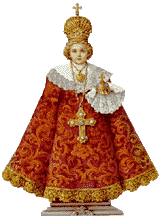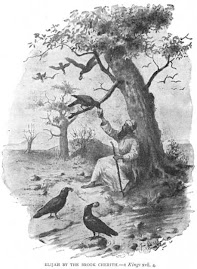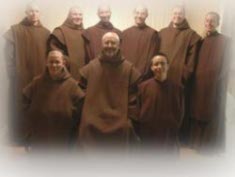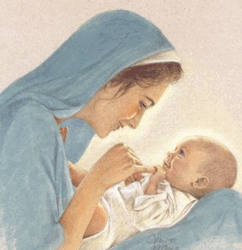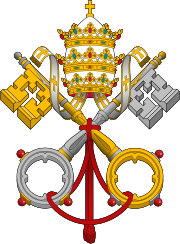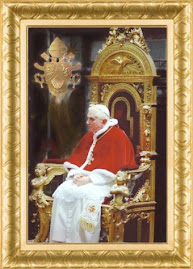In preparation for the coming Feast of Pentecost it is profitable to the soul to concentrate on Mary and the Apostles gathered together in upper room where they spent time in prayer and fasting waiting for the promised coming of the Paraclete. We will say our Novena's to the Holy Ghost and I invite you to meditate with Fr Gabriel of St Mary Magdalen OCD whose process of Beatification has already commenced, on Mary's charity, on her unceasing help as our Mediatrix and on the Holy Spirit in a series of meditations during the next week.
MEDITATION
1. In order to have even a slight understanding of Mary's prayer, we must try to penetrate the sanctuary of her intimate union with God. No one has ever lived in closer intimacy with Him. Let us reverently observe this intimacy from the viewpoint of the divine maternity. Who can imagine the secret communications between Mary and the Incarnate Word while she carried Him in her virginal womb? Although there was nothing to distinguish her exteriorly from other women in the same condition, yet, in the secrecy of her heart she led a life of the closest possible union between God and a mere creature. "Omnis gloria ejus ab intus"; all her glory is from within (Ps 44:14). All Mary's glory and grandeur were interior. In this true sanctuary which concealed the Holy of Holies, Mary, living ciborium of the Incarnate Word, was aflame with love, absorbed in adoration. Carrying within her the "burning furnace of charity," how could Mary not remain all inflamed by it! the more she was inflamed with love, the more she understood the mystery of love which was taking place within her. No one ever felt as Mary did, or had a greater knowledge of the divinity of Christ and of His infinite grandeur. No one ever felt, as Mary did, the consuming to give herself to Him, to lose herself in Him like a little drop in the immensity of the ocean. This was Mary's unceasing: to adore perpetually the Word made Flesh within her; to unite herself closely with Christ; to be immersed in Him and completely transformed in Him by love; to join the infinite homage and praise which ascended continually from the heart of Christ to the Trinity, and to offer this praise unceasingly as the only homage worthy of the divine Majesty. Mary lived in adoration of her Jesus, in union with Him, in adoration of the Trinity. There is one moment in the day when we, too, can share in this prayer of Mary in a most excellent way: the moment of Holy Communion, when we receive Jesus, real and living, into our heart. How we need Mary to help us profit from this ineffable gift! She teaches us to unite ourselves to that adoration which ascends from the heart of Jesus, that we may be transformed in Him; she teaches us to unite ourselves to that adoration which ascends from the heart of Jesus to the Trinity, and she offers it with us to the Father, thus supplying for the deficiencies in our adoration.
2. Mary spent thirty years in Bethlehem and Nazareth in sweet family intimacy with Jesus. he was her center of attraction, the object of her affections, her thoughts and solicitude. The life of Mary was centered on Him; she took care of Him, always seeking new ways of pleasing, serving, and loving Him with the greatest devotion. Her will vibrated in unison with His; her heart beat in perfect harmony with His. She "shared the thoughts of Christ and His secret wishes, in such a way that it can be said that she lived the very life of her Son" (St Pius X: Ad Diem Illum). Like Mary's life, her prayer was ever Christocentric, and Christ bore it to the Blessed Trinity. It was really the mystery of the Incarnation which brought Mary into the fullness of the Trinitarian life. Her unique relations with the three divine Persons began when the Angel told her that she was to be the Mother of the Son of the Most High and would be so by the power of the Holy Spirit. She was, from that moment, the beloved Daughter of the Father, the Spouse of the Holy Spirit, and the Mother of the Word. These relations were not limited to the time when Mary carried within her the Incarnate Word, but were to continue throughout eternity. Thus Mary is the temple of the Trinity. "Nearer than all to Jesus Christ, although at a distance that is infinite," Mary is, "the great 'praise of glory' of the Blessed Trinity" (Bl Elizabeth of the Trinity, 2:15). In Mary, we find the most perfect model for the souls aspiring to intimacy with God; at the same time, she is the surest guide for them. She leads us to Jesus and teaches us to concentrate all our affections on Him, to give ourselves entirely to Him, until we are completely lost and transformed in Him. Then, through Jesus, she guides us to the life of union with the Trinity. By reason of sanctifying grace, our soul is also a temple of the Trinity, and Mary teaches us how to abide in this temple as a perpetual adorer of the three divine Persons who dwell therein. "I do not need to make any effort," said Bl Elizabeth of the Trinity "to enter into the mystery of the divine indwelling in the soul of our Lady; my soul seems to abide there habitually, in the same attitude that was hers: adoring the God hidden within me" (Letters). May it also be given to us to live, under Mary's direction, in this attitude of continual adoration of the Trinity dwelling within our soul.
COLLOQUY
Let us pray with Bl Elizabeth of the Trinity: "O Mary, I can imagine how you must have felt when, after the Incarnation, you had within you the Word made flesh, the Gift of God! In what silence, what adoring recollection, must you have withdrawn into the depth of your soul to embrace the God whose Mother you were! Your attitude, O Blessed Virgin, during the months preceding the Nativity of Jesus, seems to be the model for interior soul, for those whom God has chosen to live within, deep in the unfathomable abyss. What peace and recollection accompanied your every action! You made ordinary things divine, because through them all, you remained the adorer of the Gift of God" (Letters 1:10).
2. Mary spent thirty years in Bethlehem and Nazareth in sweet family intimacy with Jesus. he was her center of attraction, the object of her affections, her thoughts and solicitude. The life of Mary was centered on Him; she took care of Him, always seeking new ways of pleasing, serving, and loving Him with the greatest devotion. Her will vibrated in unison with His; her heart beat in perfect harmony with His. She "shared the thoughts of Christ and His secret wishes, in such a way that it can be said that she lived the very life of her Son" (St Pius X: Ad Diem Illum). Like Mary's life, her prayer was ever Christocentric, and Christ bore it to the Blessed Trinity. It was really the mystery of the Incarnation which brought Mary into the fullness of the Trinitarian life. Her unique relations with the three divine Persons began when the Angel told her that she was to be the Mother of the Son of the Most High and would be so by the power of the Holy Spirit. She was, from that moment, the beloved Daughter of the Father, the Spouse of the Holy Spirit, and the Mother of the Word. These relations were not limited to the time when Mary carried within her the Incarnate Word, but were to continue throughout eternity. Thus Mary is the temple of the Trinity. "Nearer than all to Jesus Christ, although at a distance that is infinite," Mary is, "the great 'praise of glory' of the Blessed Trinity" (Bl Elizabeth of the Trinity, 2:15). In Mary, we find the most perfect model for the souls aspiring to intimacy with God; at the same time, she is the surest guide for them. She leads us to Jesus and teaches us to concentrate all our affections on Him, to give ourselves entirely to Him, until we are completely lost and transformed in Him. Then, through Jesus, she guides us to the life of union with the Trinity. By reason of sanctifying grace, our soul is also a temple of the Trinity, and Mary teaches us how to abide in this temple as a perpetual adorer of the three divine Persons who dwell therein. "I do not need to make any effort," said Bl Elizabeth of the Trinity "to enter into the mystery of the divine indwelling in the soul of our Lady; my soul seems to abide there habitually, in the same attitude that was hers: adoring the God hidden within me" (Letters). May it also be given to us to live, under Mary's direction, in this attitude of continual adoration of the Trinity dwelling within our soul.
COLLOQUY
Let us pray with Bl Elizabeth of the Trinity: "O Mary, I can imagine how you must have felt when, after the Incarnation, you had within you the Word made flesh, the Gift of God! In what silence, what adoring recollection, must you have withdrawn into the depth of your soul to embrace the God whose Mother you were! Your attitude, O Blessed Virgin, during the months preceding the Nativity of Jesus, seems to be the model for interior soul, for those whom God has chosen to live within, deep in the unfathomable abyss. What peace and recollection accompanied your every action! You made ordinary things divine, because through them all, you remained the adorer of the Gift of God" (Letters 1:10).

